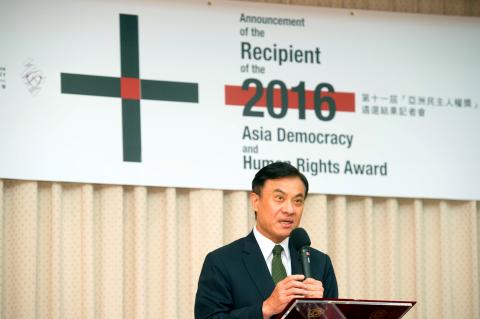The Asian Federation Against Involuntary Disappearances (AFAD) is to be given the Asia Democracy and Human Rights Award for its efforts to resolve the problem of forced disappearances in Asia.
“AFAD has made indelible contributions in pushing states to address the rights of families of the disappeared and in seeking justice for the victims,” said Legislative Speaker Su Jia-chyuan (蘇嘉全), chairman of the Taiwan Foundation for Democracy, which presents the award, after announcing the winner at a news conference yesterday.
He said that AFAD was a major force behind the UN’s adoption in 2006of the International Convention for the Protection of All Persons from Enforced Disappearances, and has in recent years been active in lobbying Asian governments to sign and ratify the convention.

Photo: courtesy of the Legislative Yuan
Su said that many instances of politically motivated disappearances also occurred in Taiwan when the nation was under authoritarian rule.
As someone who took part in rescue missions for missing people at that time, Su said he could deeply empathize with the fear experienced by the victims’ families and the hardships faced by human rights organizations in authoritarian nations.
Founded in 1998 in Manila, AFAD facilitates searches for people who are abducted or imprisoned by a state or political organization, and works to ensure the attainment of truth, justice, redress and the reconstruction of the collective memory of the missing.
The award was established by the foundation in 2006 to recognize individuals or organizations in Asia who have made significant contributions to promoting democracy through peaceful means.
Recipients of the award include Reporters Without Borders, Rescue Foundation of India, End Child Prostitution, Child Pornography and Trafficking of Children for Sexual Purposes International, as well as Kim Seong-min, founder and director of Free North Korea Radio.
The award ceremony is to take place on Dec. 10, which is International Human Rights Day, and comes with a prize of US$100,000.
Funded mainly by the government, the foundation is a nonprofit organization aimed at promoting democracy and human rights.

Aftershocks from a magnitude 6.2 earthquake that struck off Yilan County at 3:45pm yesterday could reach a magnitude of 5 to 5.5, the Central Weather Administration (CWA) said. Seismological Center technical officer Chiu Chun-ta (邱俊達) told a news conference that the epicenter of the temblor was more than 100km from Taiwan. Although predicted to measure between magnitude 5 and 5.5, the aftershocks would reach an intensity of 1 on Taiwan’s 7-tier scale, which gauges the actual effect of an earthquake, he said. The earthquake lasted longer in Taipei because the city is in a basin, he said. The quake’s epicenter was about 128.9km east-southeast

The Taipei Summer Festival is to begin tomorrow at Dadaocheng Wharf (大稻埕), featuring four themed firework shows and five live music performances throughout the month, the Taipei Department of Information and Tourism said today. The festival in the city’s Datong District (大同) is to run until Aug. 30, holding firework displays on Wednesdays and the final Saturday of the event. The first show is scheduled for tomorrow, followed by Aug. 13, 20 and 30. To celebrate the 30th anniversary of Disney Pixar's movie Toy Story, the festival has partnered with Walt Disney Co (Taiwan) to host a special themed area on

BE CAREFUL: The virus rarely causes severe illness or death, but newborns, older people and those with medical conditions are at risk of more severe illness As more than 7,000 cases of chikungunya fever have been reported in China’s Guangdong Province this year, including 2,892 new cases last week, the Centers for Disease Control (CDC) yesterday said it is monitoring the situation and considering raising the travel notice level, which might be announced today. The CDC issued a level 1 travel notice, or “watch,” for Guangdong Province on July 22, citing an outbreak in Foshan, a manufacturing hub in the south of the province, that was reported early last month. Between July 27 and Saturday, the province reported 2,892 new cases of chikungunya, reaching a total of 7,716

The New Taipei City Government today warned about the often-overlooked dangers of playing in water, and recommended safe swimming destinations to cool off from the summer heat. The following locations in the city as safe and fun for those looking to enjoy the water: Chienshuiwan (淺水灣), Baishawan (白沙灣), Jhongjiao Bay (中角灣), Fulong Beach Resort (福隆海水浴場) and Sansia District’s (三峽) Dabao River (大豹溪), New Taipei City Tourism and Travel Department Director-General Yang Tsung-min (楊宗珉) said. Outdoor bodies of water have variables outside of human control, such as changing currents, differing elevations and environmental hazards, all of which can lead to accidents, Yang said. Sudden